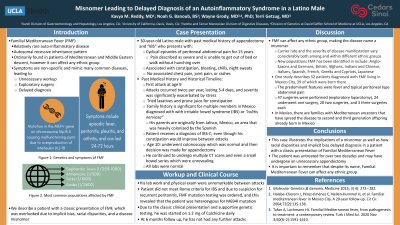Back


Poster Session B - Monday Morning
Category: Functional Bowel Disease
B0277 - Misnomer Leading to Delayed Diagnosis of an Autoinflammatory Syndrome in a Latino Male
Monday, October 24, 2022
10:00 AM – 12:00 PM ET
Location: Crown Ballroom

Has Audio

Kavya M. Reddy, MD
University of California Los Angeles David Geffen School of Medicine
Los Angeles, CA
Presenting Author(s)
Kavya M. Reddy, MD1, Noah G. Banoub, BS2, Wayne Grody, MD, PhD3, Terri Getzug, MD3
1University of California Los Angeles, Torrance, CA; 2University of California, Davis, Davis, CA; 3University of California Los Angeles, Los Angeles, CA
Introduction: Familial Mediterranean Fever (FMF) is a rare auto-inflammatory disease ordinarily found in patients of Mediterranean and Middle Eastern descent, however it can affect any ethnic group. Symptoms of FMF are non-specific and can mimic many common diseases, resulting in unnecessary workup, surgeries, and delayed diagnosis. The following case report demonstrates the ease of overlooking a classic presentation due to implicit bias, racial disparities, and a disease misnomer.
Case Description/Methods: We present a case of a 30-year-old Latino male who was evaluated for a 15 year history of episodic peritoneal type abdominal pain associated with constipation. The patient reported that his first attacks began at age 9, during which he had severe abdominal pain associated with bloating, constipation, chills and night sweats. The pain was so severe that he was unable to get out of bed or walk without hunching over. These attacks occurred twice a year, lasted 3-4 days, and severity was significantly exacerbated by stress. The patient had no relief from laxatives and prune juice taken for constipation. He stated that many family members in Mexico were diagnosed with irritable bowel syndrome (IBS) or “colitis nerviosa.” He was also told that he had IBS-C, even though his constipation and pain resolved between attacks. He reported a normal colonoscopy at age 10, in addition to an appendectomy. During one attack, his inflammatory markers were found to be markedly elevated. The patient denied any associated chest pain, joint pain, or rashes. His parents were originally from Jalisco, Mexico, an area that was colonized heavily by the Spanish. His lab work and physical exam in between attacks were unremarkable. As the patient did not meet Rome criteria for IBS, and due to the suspicion of recurrent peritonitis, MEFV mutation testing was ordered. Genetic testing revealed that the patient was heterozygous for the M694I mutation. Due to classic presentation and supportive genetic testing, he was prescribed 1.2 mg of Colchicine daily. At six months follow up, he has had no further attacks.
Discussion: This case illustrates the implications of a misnomer as well as how racial disparities and implicit bias delayed diagnosis in a patient with classic presentation of FMF. The patient was untreated for over two decades and may have undergone an unnecessary appendectomy. It is important to remember that despite the name, FMF can affect any ethnic group and awareness should be raised about this treatable disease.
Disclosures:
Kavya M. Reddy, MD1, Noah G. Banoub, BS2, Wayne Grody, MD, PhD3, Terri Getzug, MD3. B0277 - Misnomer Leading to Delayed Diagnosis of an Autoinflammatory Syndrome in a Latino Male, ACG 2022 Annual Scientific Meeting Abstracts. Charlotte, NC: American College of Gastroenterology.
1University of California Los Angeles, Torrance, CA; 2University of California, Davis, Davis, CA; 3University of California Los Angeles, Los Angeles, CA
Introduction: Familial Mediterranean Fever (FMF) is a rare auto-inflammatory disease ordinarily found in patients of Mediterranean and Middle Eastern descent, however it can affect any ethnic group. Symptoms of FMF are non-specific and can mimic many common diseases, resulting in unnecessary workup, surgeries, and delayed diagnosis. The following case report demonstrates the ease of overlooking a classic presentation due to implicit bias, racial disparities, and a disease misnomer.
Case Description/Methods: We present a case of a 30-year-old Latino male who was evaluated for a 15 year history of episodic peritoneal type abdominal pain associated with constipation. The patient reported that his first attacks began at age 9, during which he had severe abdominal pain associated with bloating, constipation, chills and night sweats. The pain was so severe that he was unable to get out of bed or walk without hunching over. These attacks occurred twice a year, lasted 3-4 days, and severity was significantly exacerbated by stress. The patient had no relief from laxatives and prune juice taken for constipation. He stated that many family members in Mexico were diagnosed with irritable bowel syndrome (IBS) or “colitis nerviosa.” He was also told that he had IBS-C, even though his constipation and pain resolved between attacks. He reported a normal colonoscopy at age 10, in addition to an appendectomy. During one attack, his inflammatory markers were found to be markedly elevated. The patient denied any associated chest pain, joint pain, or rashes. His parents were originally from Jalisco, Mexico, an area that was colonized heavily by the Spanish. His lab work and physical exam in between attacks were unremarkable. As the patient did not meet Rome criteria for IBS, and due to the suspicion of recurrent peritonitis, MEFV mutation testing was ordered. Genetic testing revealed that the patient was heterozygous for the M694I mutation. Due to classic presentation and supportive genetic testing, he was prescribed 1.2 mg of Colchicine daily. At six months follow up, he has had no further attacks.
Discussion: This case illustrates the implications of a misnomer as well as how racial disparities and implicit bias delayed diagnosis in a patient with classic presentation of FMF. The patient was untreated for over two decades and may have undergone an unnecessary appendectomy. It is important to remember that despite the name, FMF can affect any ethnic group and awareness should be raised about this treatable disease.
Disclosures:
Kavya Reddy indicated no relevant financial relationships.
Noah Banoub indicated no relevant financial relationships.
Wayne Grody indicated no relevant financial relationships.
Terri Getzug indicated no relevant financial relationships.
Kavya M. Reddy, MD1, Noah G. Banoub, BS2, Wayne Grody, MD, PhD3, Terri Getzug, MD3. B0277 - Misnomer Leading to Delayed Diagnosis of an Autoinflammatory Syndrome in a Latino Male, ACG 2022 Annual Scientific Meeting Abstracts. Charlotte, NC: American College of Gastroenterology.
